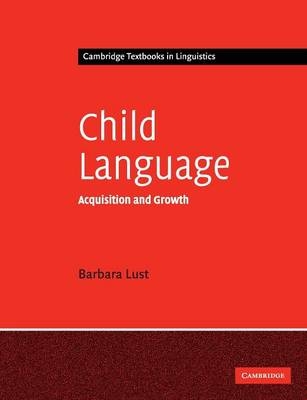
Child Language
Acquisition and Growth
Seiten
2006
Cambridge University Press (Verlag)
978-0-521-44922-9 (ISBN)
Cambridge University Press (Verlag)
978-0-521-44922-9 (ISBN)
Language is a skill that young children master with incredible ease and speed, and the remarkable way in which they achieve this has long fascinated linguists and developmental psychologists alike. This accessible new textbook introduces the field of child language acquisition, exploring language development from birth.
The remarkable way in which young children acquire language has long fascinated linguists and developmental psychologists alike. Language is a skill that we have essentially mastered by the age of three, and with incredible ease and speed, despite the complexity of the task. This accessible textbook introduces the field of child language acquisition, exploring language development from birth. Setting out the key theoretical debates, it considers questions such as what characteristics of the human mind make it possible to acquire language; how far acquisition is biologically programmed and how far it is influenced by our environment; what makes second language learning (in adulthood) different from first language acquisition; and whether the specific stages in language development are universal across languages. Clear and comprehensive, it is set to become a key text for all courses in child language acquisition, within linguistics, developmental psychology and cognitive science.
The remarkable way in which young children acquire language has long fascinated linguists and developmental psychologists alike. Language is a skill that we have essentially mastered by the age of three, and with incredible ease and speed, despite the complexity of the task. This accessible textbook introduces the field of child language acquisition, exploring language development from birth. Setting out the key theoretical debates, it considers questions such as what characteristics of the human mind make it possible to acquire language; how far acquisition is biologically programmed and how far it is influenced by our environment; what makes second language learning (in adulthood) different from first language acquisition; and whether the specific stages in language development are universal across languages. Clear and comprehensive, it is set to become a key text for all courses in child language acquisition, within linguistics, developmental psychology and cognitive science.
Barbara Lust is Professor in the Department of Human Development, Cornell University, New York.
1. The growth of language; 2. What is acquired?; 3. What is the problem of language acquisition?; 4. How we can construct a theory of language acquisition; 5. Brain and language development; 6. The nature of nurture; 7. How can we tell what children know?: methods for the study of language acquisition; 8. The acquisition of phonology; 9. The acquisition of syntax; 10. The acquisition of semantics; 11. On the nature of language growth; 12. Conclusions: towards an integrated theory of language acquisition.
| Erscheint lt. Verlag | 21.9.2006 |
|---|---|
| Reihe/Serie | Cambridge Textbooks in Linguistics |
| Zusatzinfo | 29 Tables, unspecified |
| Verlagsort | Cambridge |
| Sprache | englisch |
| Maße | 173 x 244 mm |
| Gewicht | 730 g |
| Themenwelt | Geisteswissenschaften ► Sprach- / Literaturwissenschaft ► Romanistik |
| Geisteswissenschaften ► Sprach- / Literaturwissenschaft ► Sprachwissenschaft | |
| ISBN-10 | 0-521-44922-7 / 0521449227 |
| ISBN-13 | 978-0-521-44922-9 / 9780521449229 |
| Zustand | Neuware |
| Haben Sie eine Frage zum Produkt? |
Mehr entdecken
aus dem Bereich
aus dem Bereich
Buch | Softcover (2022)
De Gruyter (Verlag)
CHF 27,90
Deutsch – Französisch – Italienisch – Spanisch
Buch | Softcover (2023)
Narr Francke Attempto (Verlag)
CHF 39,15


